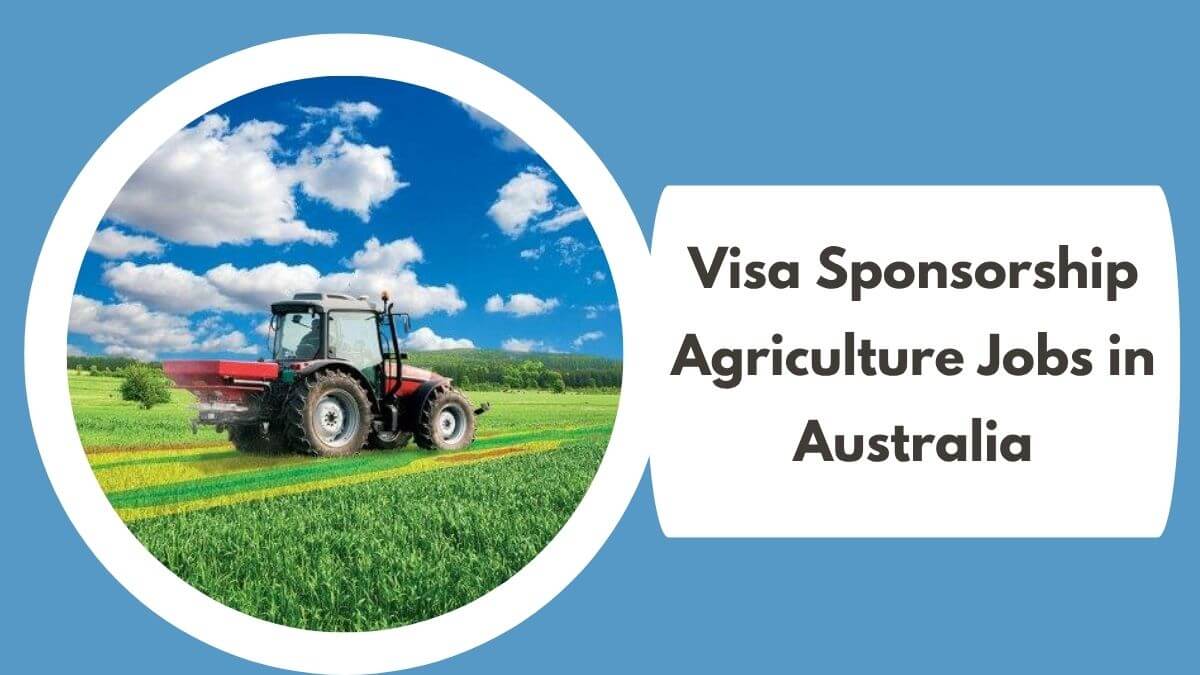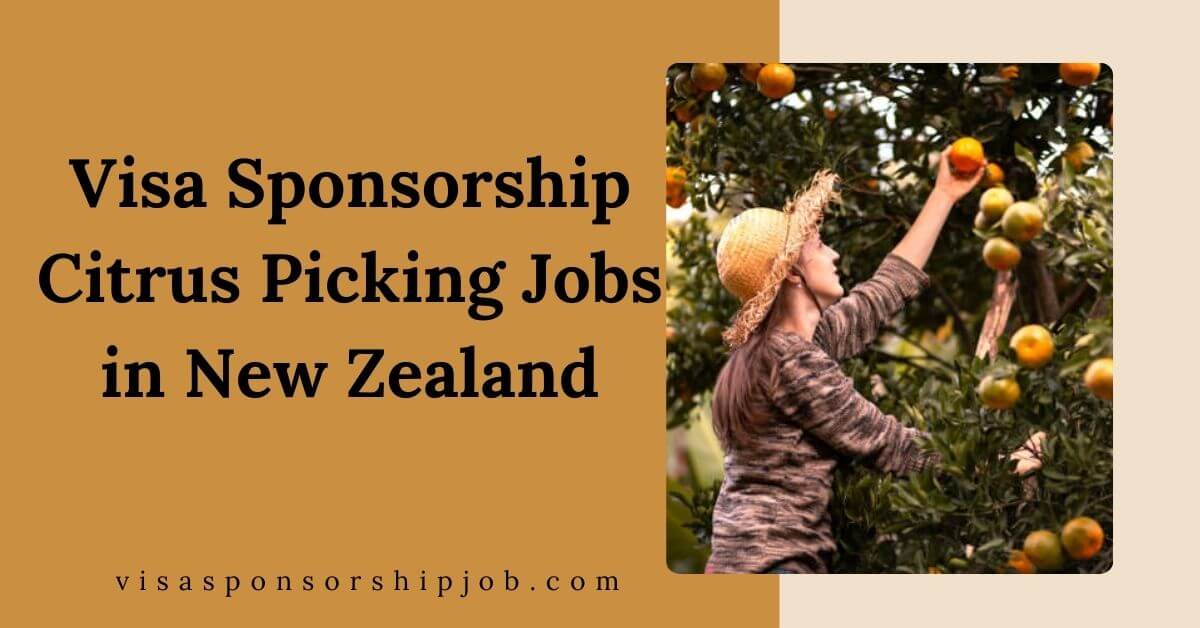Does your farming or agricultural business need outside experts to help with routine requests? Or is it necessary to travel to Australia in order to work in cultivation? The government announced. that it would offer a dedicated Farming Visa to allow vagrants from specific countries to travel to Australia for agricultural labor that cannot be done domestically. The purpose of the visa is to lessen labor shortages that, according to reports, have gotten worse in the agriculture sector. Here are some things you should know about Australia’s farming visa and the steps the government takes to put it up.
When thinking about nearly pursuing jobs in Australia with visa sponsorship, it is essential to establish a large number of visa sponsorships that are available and meet their requirements. Depending on the nature and duration of the business, managers in Australia can help talented father professionals through a variety of visa categories. The majority of visa sponsorship choices might be broken down more precisely as follows:
List of Agriculture Jobs in Australia
The list of farming jobs available in Australia is as follows:
Crop farming
A plant that may be widely cultivated and gathered for use or sustenance could be considered an edit. Put differently, a trim might be a plant or plant product that is produced for a specific purpose, like fuel, fiber, or nutrition.
Fruit farming
fruit, a flowering plant’s plump or dry-aged ovary that contains one or more seeds. In this sense, fruits include apricots, bananas, grapes, bean cases, maize grains, tomatoes, cucumbers, and (in their shells) almonds and oak seeds.
Horticulture
The art and science of growing plants is called horticulture. The Latin words hortus, meaning “plant,” and cultura, meaning “to develop,” provide the historical foundation for this concept. There are distinct categories of horticulture since plants are developed for a variety of uses.
Livestock farming
The word “animals” refers to a variety of animals, including pigs, sheep, goats, dairy products, horses, and chickens reared for food. These animals are raised through animal husbandry for a variety of uses, including clothing, food, and transportation.
Poultry farming
Raising domesticated birds, such as chickens, ducks, turkeys, and geese, for the purpose of providing meat or eggs for human consumption is known as poultry farming. The majority of chickens are raised in big quantities. Every year, around 60 billion chickens are killed for human consumption.
Bee farming
The goal of bee farmers is to manage nectar bee populations in order to conduct profitable business ventures. Businesses in Australia range in size from self-employment to major operations employing 12 or more people year-round to part-time businesses providing an additional source of income.
Aquaponics
Aquaponics is a method of producing food that combines hydroponics—growing plants in water—with aquaculture—raising marine animals like prawns, snails, crawfish, and anglers in tanks—by feeding the nutrient-rich aquaculture water to the hydroponically grown plants.
Energy farming
It is dedicated to establishing sun-oriented boards or photovoltaic frameworks to capture sun-oriented radiation and transform it into renewable electrical energy. It is also known as a sun-powered cultivation or sun-based agriculture.
General Responsibilities for Visa Sponsorship Agriculture Jobs in Australia:
planned, prepared, and planted field crops; oversaw water systems; and counted seeds, fertilizer, and pesticides.
- Maintain documentation, evaluate edit yields, screen soil moisture, and promote editor well-being.
- Maintain stakes, trellises, and other rural constructions.
- Farmhands must be prepared, supervised, and driven.
- Create gathering and capacity areas with success.
- Keep an eye out for fertilizer and rubbish, and use fertilizer as fertilizer.
- Maintain thorough records and count inventories.
- Keep bugs under control.
- Make sure that all rules are being followed.
- oversees, plans, and directs all farm-related activities, including equipment development.
- oversees the animals’ well-being and productivity.
- Engage in conversation with buyers, sellers, and other development officials.
- investigates state-of-the-art rural innovations and develops historical techniques.
- preserves the sterility of the farm.
- Plant, care for, and harvest crops; measure and assess soil hydration and health; and apply fertilizer and pesticides as necessary.
- Maintain and operate water infrastructure, tractors, plows, and other farming equipment.
Check Also: Food Factory Worker Jobs in Australia – Apply Now
Benefits of Visa Sponsorship Agriculture Jobs in Australia:
- Legal Right to Work and Live in Australia Through Sponsorship: You can lawfully live and work in Australia under a recognized visa category if you land a job in agriculture that is sponsored by a visa.
- Possibility of Employment in a Year-Round, High-Demand Sector: Australia’s extensive agricultural sector continuously needs workers for jobs in harvesting crops, caring for livestock, picking fruit, and operating machinery.
- No Academic Requirements for Many Roles: People with little formal education can work in many agricultural jobs since they are open to unskilled or semi-skilled individuals.
- Pathway to Permanent Residency Through Regional Employment: Under Australia’s skilled migration policies, employment in regional agricultural areas may entitle you to long-term or permanent residency.
- Competitive Hourly earnings with Seasonal Bonuses and Overtime: Australian farm workers receive fair hourly earnings with the possibility of earning more through peak-season bonuses or overtime.
- Employers Provide Free or Reduced Housing: To assist you save money on living expenses, many sponsoring farms provide free or inexpensive housing on-site.
- Access to Australia’s Public Healthcare System (on specific visas): Visa holders may be eligible for employer-sponsored health insurance or Medicare, which can provide comfort while visiting.
- Practical Experience with Contemporary Farming Tools and Methods: Modern equipment and eco-friendly methods are frequently used in agricultural occupations, which provides invaluable experience.
- Participation in Australia’s Pacific Labour Scheme or Seasonal Worker Program: These immigration pathways are intended especially for foreign agricultural laborers and provide organized assistance and safeguards.
- Multicultural Workplaces with International Coworkers: People from all over the world work on Australia’s farms, fostering a varied and inclusive work environment.
- The employer handles the paperwork and application process for visas. Employers usually take care of the difficult visa application procedure when you are sponsored, which saves you time and worry.
- Job Role Flexibility Across Various Farm Types: Your skills may be expanded by gaining experience in picking fruits and vegetables, handling livestock, irrigation, operating machinery, or packing.
- Financial Stability in a Safe and Regulated Industry: Australian labor laws govern agricultural work, guaranteeing that you are paid fairly and have safe working conditions.
- Choosing to Bring Dependents Depending on the type of visa: You can bring your spouse and kids to live with you in Australia through certain sponsorship avenues.
- Gateway to Technical Agricultural Roles or Other Skilled Trades: With experience, you can advance to higher-paying careers in agribusiness, equipment operation, or supervisory roles.
Salary:
In Australia, the average hourly wage for horticulture is $25.31-30.00, or $98,592 per year. While entry-level positions start at $81,338 per year, the majority of experienced specialists make up to $141,500.
Conclusion:
Cereals, grains, and vegetables are examples of crops. Although it needs a wide variety of arrivals, wheat is the crop with the most significant commitment to production value. In Australia, wheat yields have fluctuated between two metric tons per acre.
Frequently Asked Questions:
How do I get an Australian agriculture visa?
meet the minimum age requirement of 21 years of age with no maximum age requirement; meet all character and health requirements; and have adequate health insurance for the period of stay in Australia. The cost of the visa application is AUD$315.
Are agriculture jobs in demand in Australia?
From dairy farming to crop harvesting, there are numerous roles available for international workers. The Australian government is facilitating the hiring of foreign workers to meet the rising demand for labor, with projected job openings ranging between 180,000 and 200,000 positions in 2026.
What is in agriculture?
Agriculture is the broad term for everything that goes into growing crops and raising animals to provide food and materials that people can use and enjoy. Farming, which involves cultivating the land and raising livestock, is one part of agriculture, which also includes plant science.






